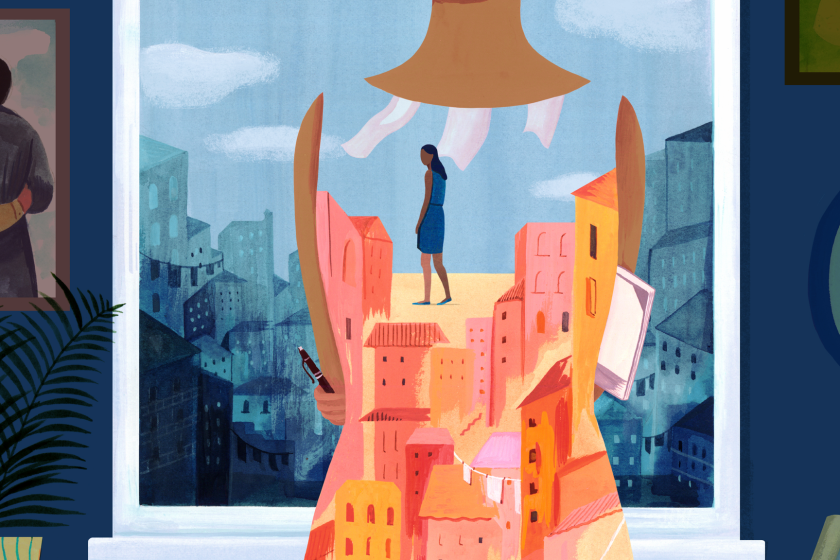Growing up is hard to do in Elena Ferrante’s ‘The Lying Life of Adults’

- Share via
If you buy books linked on our site, The Times may earn a commission from Bookshop.org, whose fees support independent bookstores.
What exactly is an adult? Where is the line that divides our formative selves from our formed selves? The bildungsroman, the coming-of-age novel, is obsessed with this process. The great ones — “A Tree Grows in Brooklyn,” “Jane Eyre,”and “Mansfield Park” — slip over the line smoothly; we don’t feel the hitch. But then they double back as their characters struggle to pull on a variation of their younger selves, like a dress that fit last summer but has now crept up, exposing unseemly parts. The discomfort is the point.
Elena Ferrante is the new undisputed master of the form, stretching out the dress-tugging of girlhood into her Neapolitan quartet. Over the course of those four novels, Lenù and Lila — bright, wary, hardening girls on the outskirts of Naples in the 1950s — rest like counterbalances on a set of scales; one grows up too soon, the other too slowly.
The premise of Ferrante’s new novel, “The Lying Life of Adults” — a teenage girl named Giovanna in 1990s Naples agonizing over her changing face and her parents’ breakup — sounds very Ferrantian, like “My Brilliant Friend” for the friendless. It’s also, bizarrely, rather run-of-the-mill, like her take on an after-school special.
You need to understand a bit about Naples for “The Lying Life of Adults” to really make sense. Giovanna, an only child, lives with her professor parents in Vomero, a neighborhood on one of Naples’ hills. Lenù and Lila lived far enough from the sea that after a full day of walking, they didn’t quite make it. By contrast, views of the azure gulf mark Vomero as a district for the educated, the up and coming. At a pleasant remove from the waterfront, the wealthy of Vomero float above the city’s grit, literally looking down on what Giovanna has been taught are the riffraff below.
Giovanna starts out as a young girl dependent on her family for behavioral cues. Her parents, orderly and groomed, “the only clear figures in a world that was otherwise confused,” expect a life of the mind for her. But when she overhears her father tell her mother Giovanna is “getting the face of Vittoria,” it kicks her into a tailspin that lasts for years.
Her aunt Vittoria, with her bawdy rants and pile of black hair, lives down the hill near the city’s “Industrial Zone” in an apartment that reeks of “cigarette butts and filth.” She speaks mostly in a quick Neapolitan dialect Giovanna can barely comprehend. (The reason for the siblings’ falling out is purposely muddied. “She refused to accept your father’s success,” Giovanna’s mother explains. Vittoria simply insists, “Your father is a jerk.”)
The novel follows Giovanna’s wild zigzags between Vittoria’s poor but lively neighborhood and her parents’ outwardly sedate, inwardly unraveling home. Vittoria introduces her to the family of her former lover, with whom she’s grown close. Giovanna’s father, meanwhile, moves in with his longtime mistress, Costanza, a close family friend. Giovanna graduates from “pink shoes, pink jacket, pink barrette” — a tidy puffball of a girl — to slashes of black eyeliner and the hangdog expression of a junior varsity goth.
Giovanna is desperate to understand the moral weight of the decisions made by the grownups she’s meant to emulate. “What happened,” she wonders, “in the world of adults, in the heads of very reasonable people, in their bodies loaded with knowledge? What reduced them to the most untrustworthy animals, worse than reptiles?” The answer she comes to, without quite ever realizing it, is that no matter the misbehavior, it’s lying that marks a person as bad. The quest for total honesty is one only a teenager could pursue with a straight face.
Hence the book’s strange, grammatically tenuous title. To Giovanna, adults are engaged in a vast conspiracy of repression; to grow up is to abandon truth. That’s just how the lying life goes. (In Italian the novel is titled “La vita bugiarda degli adulti,” and “bugiarda” can, slantwise, translate to “storyteller.”)
HBO, which has been celebrated for distinctive and groundbreaking programming, is about to launch its first foreign-language series, “My Brilliant Friend.”
At the same time, Giovanna’s expectations of adulthood would often seem, to adults, absurd.
Love is always a choice: “[H]ow had my father fallen in love with the wife of his best friend not as a victim of fleeting infatuation but ... in a deliberate way, so that his love still endured?” Restraining one’s emotions is always a lie: If a man had done to Giovanna what her father had done to her mother, “I would bash in his chest and tear out his heart.”
There’s no facet of teenage rebellion that Ferrante leaves unnarrated; Giovanna ditches classes, fails a grade, sneaks out, goes joyriding and mopes. (“I wasn’t intelligent, I wasn’t capable of good intentions, I wasn’t pretty, I wasn’t even nice.”) At some middle point, the story picks up steam, as Giovanna turns almost violently self-reflective and then rebels against her own instincts — agreeing to oral sex in a park, letting a teenage boy slip into her family’s apartment — unconsciously mimicking the sexual abandon for which she loathes her father. And here Ferrante’s rigorous, undaunted prose comes to the fore, culminating in a Sebaldian two-page-long rant of a sentence that comes falling out of Giovanna’s father’s mouth.
As adults fail her, Giovanna’s value system somersaults: “My aunt, who was vulgar, became a woman of taste. My father and Costanza, people of taste, became … vulgar.” She considers what it might take to be one of the “superior people” her family goes on about. She ricochets around Naples’ neighborhoods, up and down the hill, as her moods and alliances shift. “The Lying Life of Adults” can’t sit still, and Giovanna wriggles through so many abrupt reversals that while Ferrante captures the flightiness of adolescence, her narrative sometimes sputters and stumbles.
I’m delighted by the idea of a bildungsroman that doesn’t automatically launch its protagonist into an adult life of wisdom and serenity. What makes Giovanna so special is the way she deems grownups no smarter or more emotionally adaptable than the most hormonally motivated teens. But at the end of “The Lying Life of Adults,” there’s little to indicate whether even Giovanna has taken notice of who she herself is.
“My Dark Vanessa” is the latest and most unsettlingly effective book in a timely genre.
Ferrante is still Ferrante — her characters have wide-spanned souls and so does Naples, exuding the smells of the sea and gasoline and baking crust. But without a counterbalance, her own brilliant friend, poor Giovanna drifts. I wanted to see her tethered to something, anything, even if it was her own unsteadiness. Perhaps Ferrante is saving that for a sequel.
Kelly’s work has been published in New York magazine, Vogue, the New York Times Book Review and elsewhere.
The Lying Life of Adults
Elena Ferrante, translated by Ann Goldstein
Europa: 324 pages, $26
More to Read
Sign up for our Book Club newsletter
Get the latest news, events and more from the Los Angeles Times Book Club, and help us get L.A. reading and talking.
You may occasionally receive promotional content from the Los Angeles Times.











